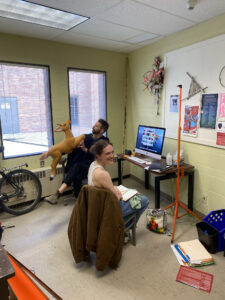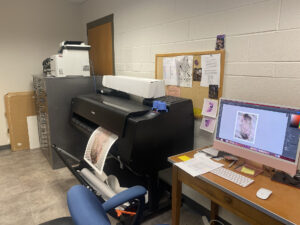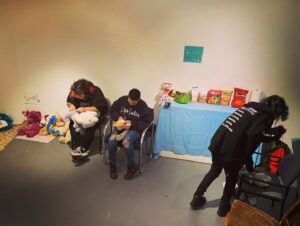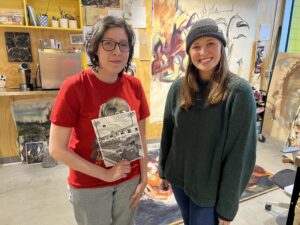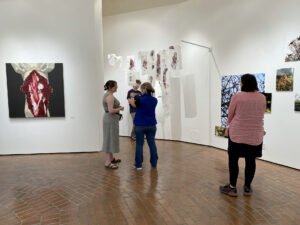Art Major, Bachelor of Fine Arts (BFA)
The BFA in Art is a professional degree that prepares students for creative careers and/or further pursuit of a Master of Fine Arts Degree. The program offers a focus on studio practice with added emphasis on conceptual exploration, professional skills, and knowledge in contemporary art. BFA students develop, produce, and exhibit a cohesive body of work. The program combines personal expression with technical skills, working closely with peers and faculty to develop independent visions. Students develop multiple professional skills such as creative problem solving, collaboration, project management, and public speaking to prepare them for any creative career.
BFA students are recommended to declare a minor in Visual Culture and/or a related field of study that supports their goals and interests. Students work closely with an art faculty advisor as they complete the BFA in Art. Please meet with an art faculty advisor to discuss minors and areas of interest. All students have the opportunity to gain professional experience with an art internship.
| IMAGE AND TECHNOLOGY | 5 |
| METHODS AND MATERIALS | 5 |
| DRAWING | 5 |
| CAREERS IN THE ARTS | 2 |
| ART ACROSS TIME: 18TH CENTURY TO CONTEMPORARY | 5 |
| or | ART ACROSS TIME: PREHISTORY TO 17TH CENTURY |
| or | HISTORY OF PHOTOGRAPHY |
| THE BODY IN ART | 5 |
| or | NATIVE NORTH AMERICAN ART |
| CONTEMPORARY ART | 5 |
| ART AS SOCIAL ACT | 5 |
| or | ART AND COMMUNITY |
| |
| CERAMICS I | |
or | CERAMICS II |
| ILLUSTRATION | |
| DIGITAL ART | |
&
| PHOTOGRAPHY: DIGITAL PRACTICES
and PHOTOGRAPHY: DIGITAL PRACTICES LAB | |
&
| PHOTOGRAPHY: BLACK AND WHITE
and PHOTOGRAPHY: BLACK AND WHITE LAB | |
| JEWELRY | |
| PAINTING | |
| WATERCOLOR | |
| PRINTMAKING | |
| SCULPTURE | |
| FIBER AND TEXTILES | |
| EXPERIMENTAL | |
| |
| |
| DRAWING | |
| FIGURE DRAWING | |
| DIGITAL ART: THE MOVING IMAGE | |
&
| EXPANDED PHOTO/MEDIA
and EXPANDED PHOTO/MEDIA LAB | |
| BODY AND TIME | |
| CERAMICS III | |
| WORKSHOP IN ART | |
| PAINTING II | |
| WATERCOLOR II | |
| PRINTMAKING | |
| SCULPTURE II | |
| EXPERIMENTAL | |
| |
| TOPICS IN PROFESSIONAL PRACTICE | |
| INTERNSHIP | |
| MAKING AND MEANING (must be repeated) | 6 |
| BFA THESIS AND EXHIBITION | 5 |
| SENIOR CAPSTONE | 5 |
| Total Credits | 93-103 |
The following plan of study is for a student with zero credits. Individual students may have different factors such as: credit through transfer work, Advanced Placement, Running Start, or any other type of college-level coursework that requires an individual plan.
Courses could be offered in different terms, checking the academic schedule is paramount in keeping an individual plan current. Students should connect with an advisor to ensure they are on track to graduate.
All Undergraduate students are required to meet the Undergraduate Degree Requirements.
| First Year |
|---|
| Fall Quarter | Credits | Winter Quarter | Credits | Spring Quarter | Credits |
|---|
| 5 | | 5 | or | 5 |
| or (Humanities & Arts BACR 1) | 5 | | 5 | Diversity - graduation requirement1 | 5 |
| 5 | Humanities & Arts BACR 21 | 5 | Social Science BACR 11 | 5 |
| | 15 | | 15 | | 15 |
| Second Year |
|---|
| Fall Quarter | Credits | Winter Quarter | Credits | Spring Quarter | Credits |
|---|
| 2 | | 5 | Art Experience Elective2 | 5 |
| Natural Science BACR 11 | 5 | Global Studies - graduation requirement1 | 5 | Elective - minor or general elective | 5 |
| Social Science BACR 21 | 5 | Natural Science BACR 21 | 5 | Elective - minor or general elective | 5 |
| Elective - minor or general elective | 5 | | |
| | 17 | | 15 | | 15 |
| Third Year |
|---|
| Fall Quarter | Credits | Winter Quarter | Credits | Spring Quarter | Credits |
|---|
| or | 5 | , , or | 5 | | 5 |
| Art Experience Elective2 | 5 | Art Experience Elective2 | 5 | or | 4 |
| Elective - minor or general elective | 5 | Elective - minor or general elective | 5 | Art Development Elective3 | 5 |
| | 15 | | 15 | | 14 |
| Fourth Year |
|---|
| Fall Quarter | Credits | Winter Quarter | Credits | Spring Quarter | Credits |
|---|
| or | 4 | | 3 | | 5 |
| 3 | (Senior Capstone - graduation requirement) | 5 | or | 5 |
| Art Development Elective3 | 5 | Art Development Elective3 | 5 | Art Development Elective3 | 5 |
| Elective - minor or general elective | 2 | Elective - minor or general elective | 2 | |
| | 14 | | 15 | | 15 |
| Total Credits 180 |
Students who earn a BFA in Art from EWU should be able to:
- create works of art that demonstrate technical skill;
- produce a professional quality artist’s portfolio;
- use appropriate terminology to evaluate works of art;
- write a well-crafted artist statement;
- produce a coherent body of work for exhibition.
